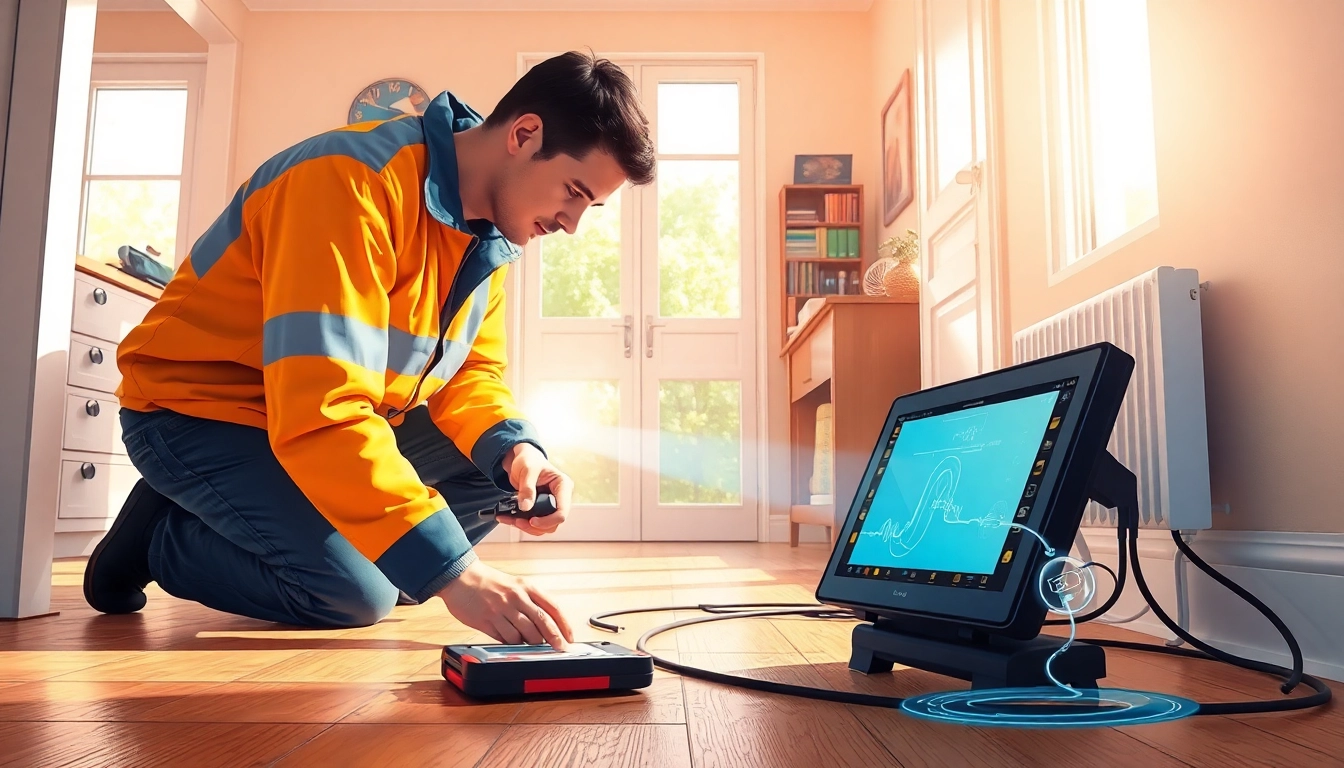Understanding Leak Detection Cornwall
Leak detection is a critical aspect of maintaining any property, particularly in regions like Cornwall that experience varying climates and aging infrastructure. The ability to identify leaks promptly can save homeowners significant time, money, and stress. In this guide, we will provide you with a comprehensive understanding of leak detection in Cornwall, including its importance, the different types of leaks commonly found, and effective methods to detect and manage them. By prioritizing leak detection, homeowners can ensure the longevity of their homes and the comfort of their living environments. For expert help with leak issues, refer to Leak Detection Cornwall.
What is Leak Detection?
Leak detection refers to the process of identifying and locating leaks in various systems, including water supply lines, drainage systems, and heating systems. This process employs various techniques and technologies to systematically analyze the property for signs of water loss, moisture accumulation, or damage due to leaks. Effectively detecting leaks early prevents water damage, which can lead to mold growth, structural damage, and increased utility costs.
Importance of Early Leak Detection
Proactively detecting leaks means addressing potential issues before they exacerbate. Early detection can:
- Reduce repair costs: Identifying a leak early can prevent minor issues from escalating into major repairs that require extensive work and higher expense.
- Conserve water: With global concerns about water scarcity, detecting and fixing leaks promptly conserves precious resources.
- Protect property value: Properties with recurring moisture issues or water damage may face depreciation in value. Early leak detection protects investment.
- Enhance health: Leaks can lead to mold and mildew growth, impacting indoor air quality and potentially causing respiratory issues for occupants.
Types of Leaks Commonly Found in Cornwall
Cornwall’s unique environment presents various potential leak sources. Some of the common types include:
- Pipe Leaks: Aging pipes, especially those made of galvanized steel or polybutylene, may corrode or fracture, leading to leaks.
- Foundation Leaks: Water intrusion through the foundation can cause significant structural issues.
- Roof Leaks: Heavy rain or snow can lead to roof leaks, particularly in older buildings with outdated roofing materials.
- Basement Leaks: Groundwater seepage into basements can cause humidity problems, leading to mold.
- Appliance Leaks: Household appliances like dishwashers and washing machines are common sources of leaks due to failures in hoses or seals.
Methods for Effective Leak Detection Cornwall
Non-Destructive Leak Detection Techniques
Non-destructive leak detection methods aim to locate leaks without causing damage to walls, floors, or landscapes. These techniques can effectively pinpoint leaks using various tools and technologies:
- Infrared Thermography: This technique uses infrared cameras to detect heat variations in materials. Since water leaks can cause a temperature difference in surfaces, infrared thermography can visually pinpoint areas of concern.
- Acoustic Leak Detection: By employing sensitive microphones, professionals can listen for sounds of leaks—water escaping under pressure through pipes creates identifiable sounds.
- Moisture Meters: These handheld devices measure moisture levels in materials, indicating possible leaks hidden behind walls or beneath floors.
Technologies Used in Leak Detection
The advancement in technology has revolutionized leak detection techniques. Here are some cutting-edge methods currently in use:
- Smart Water Meters: These devices track water usage patterns in real-time and can alert homeowners to irregular spikes that may indicate leaks.
- Ground Penetrating Radar (GPR): GPR utilizes radar pulses to image the subsurface, allowing for the detection of buried pipes and locating leaks without excavation.
- Video Inspection: Closed-circuit television (CCTV) cameras can be sent down drains and pipes to visually assess their condition and pinpoint leaks and blockages.
DIY Methods for Early Leak Detection
Detecting leaks doesn’t always require professional intervention. Homeowners can implement several DIY methods to help identify issues early:
- Inspecting Water Bills: Regularly reviewing water bills can help you spot unusual spikes in usage that might indicate a leak.
- Checking Water Pressure: A noticeable drop in water pressure can signal leaks; consider using a pressure gauge to monitor this.
- Visual Inspections: Regularly checking for water stains, discoloration, or unusual dampness in walls, ceilings, and floors can help catch leaks before they worsen.
- Testing for Toilet Leaks: Add a few drops of food coloring to your toilet tank. If the color appears in the bowl shortly after, you have a leak.
Choosing a Leak Detection Cornwall Service
Factors to Consider When Hiring a Service
When seeking professional assistance with leak detection, consider the following factors:
- Experience and Expertise: Opt for companies with extensive experience in leak detection and a proven track record in handling diverse scenarios.
- Technology Used: Verify that the company employs modern technologies and techniques, which can enhance accuracy in diagnosis.
- Customer Reviews: Look for client testimonials and reviews to gauge the reliability and quality of service provided by the company.
Questions to Ask a Leak Detection Professional
Before hiring a leak detection expert, ask these crucial questions:
- What types of leak detection technologies do you employ?
- Can you provide references from past clients?
- What is your typical process for detecting leaks?
- Do you offer a warranty or guarantee on your services?
- What measures do you take to prevent damage to my property?
Evaluating Service Provider Credentials
Ensure that the company you hire is qualified by checking the following credentials:
- Licenses and Certifications: Verify that the service provider has the necessary licensing to operate in Cornwall, ensuring compliance with local regulations.
- Insurance: Ensure the company is adequately insured to protect against any damage or injuries that may occur during the detection process.
- Training: Inquire about the training undergone by technicians and any continuing education they pursue to stay updated on technology and techniques.
Preventing Future Leaks in Cornwall
Regular Maintenance Tips for Homeowners
Adopting proactive maintenance measures can help prevent leaks and extend the lifespan of your plumbing systems:
- Routine Inspections: Schedule annual plumbing inspections to identify potential areas of concern before they become problematic.
- Winterization: Insulate pipes and perform proper winterization protocols to prevent freezing and cracking during colder months.
- Keep Drains Clear: Regularly clean out drains and gutters to prevent clogs, which can lead to pressure build-up and leakage.
Monitoring Water Usage Effectively
Monitoring your water usage is an effective way to identify irregularities and potential leaks:
- Install a Smart Meter: These devices allow you to track water usage in real-time and alert you to unusual spikes.
- Report Suspicious Changes: Be attentive to any sudden changes in your water pressure or consumption and report them to a professional.
Implementing Advanced Technologies for Leak Prevention
Incorporating modern technology can drastically reduce the risk of future leaks:
- Smart Home Integration: Many smart home systems now allow homeowners to manage and monitor their water use, detecting leaks instantly.
- Pressure Regulation: Install pressure regulators to maintain optimal water pressure and reduce the likelihood of pipe bursts.
Measuring the Impact of Leak Detection Cornwall
Cost Savings Through Early Leak Detection
One of the most tangible benefits of early leak detection is the cost savings that homeowners can achieve:
- Reduced Repair Costs: Addressing small leaks early can prevent costly damage resulting from prolonged exposure to water.
- Lower Water Bills: Continuous monitoring and remediation of leaks lead to lower monthly water bills, contributing to long-term savings.
Environmental Benefits of Addressing Leaks
In addition to financial savings, leak detection contributes positively to environmental conservation:
- Water Conservation: Fixing leaks helps to conserve precious water resources, especially in areas prone to drought.
- Decrease in Environmental Damage: Preventing leaks reduces the risk of soil erosion, contamination, and damage to local ecosystems.
Long-term Effects on Property Value
Addressing leak issues promptly can significantly enhance property values over time:
- Maintenance Records: Documented proof of regular leak detection and repair can enhance your property’s marketability.
- Attraction for Buyers: Properties maintained with attention to leak prevention are more appealing to buyers and often command higher offers.




